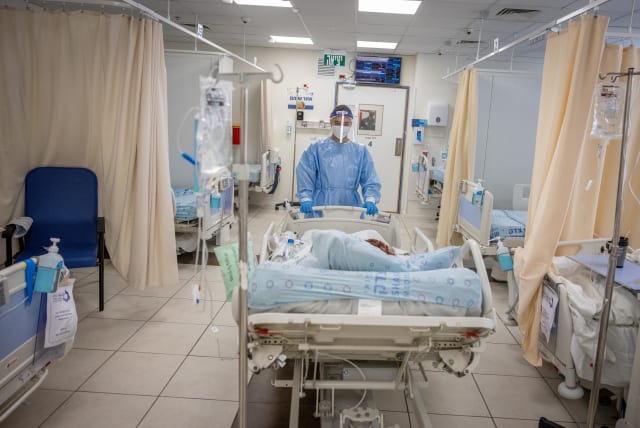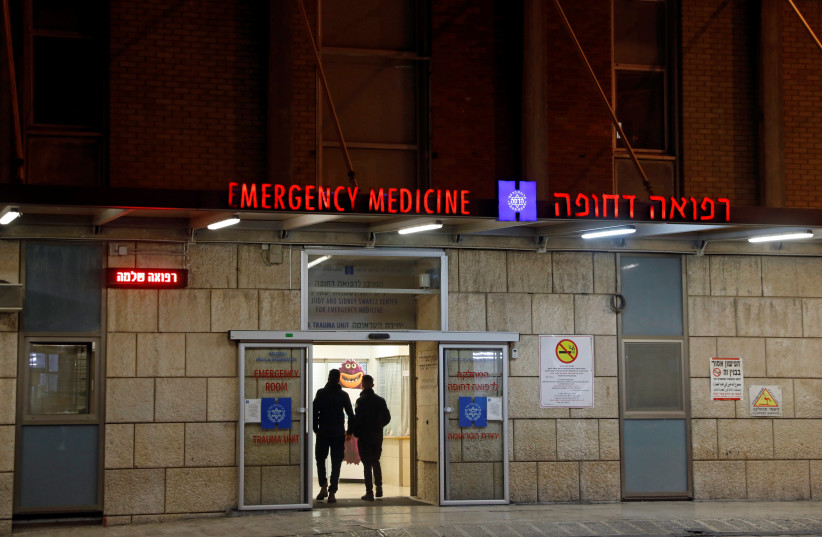Israeli hospitals regularly overcrowded, not enough investment from gov't

Jerusalem’s Shaare Zedek Medical Center asked Magen David Adom not to bring urgent patients to its emergency department until further notice because it is at 300% capacity.
Overcrowded hospital emergency rooms are a chronic condition in hospitals around the year throughout Israel due to the serious lack of governmental investment in health services that makes the country look very bad in comparison with other OECD countries.
Jerusalem’s Shaare Zedek Medical Center (SZMC) asked Magen David Adom (MDA) not to bring urgent patients to its emergency department until further notice because it is at 300% capacity. Instead, it asked that such patients be taken to other hospitals in the area.
SZMC spokesman Yossi Gottesman said the overcrowding and request to send emergency patients to other hospitals arose from the many winter diseases. Many are hospitalized in wards that need further hospitalization where there are no available beds. In addition, there is a lack of continuous hospitalization beds in geriatric hospitals, so acute patients have to remain at SZMC.
Prof. Kobi Assaf, head of the Center for Emergency Medicine at Hadassah University Medical Center in Ein Kerem, told The Jerusalem Post on Monday that its own emergency departments, both adult and pediatric and in Ein Kerem and on Mount Scopus, are also seriously overcrowded. “We have received more patients as a result of the SZMC request. We only very rarely ask MDA not to bring emergency patients here, and we are not allowed by law to send away any emergency patient who comes to our door, and it is against our philosophy.”
Assaf could not explain the large number of emergency patients at this time. “The winter has been rather mild. It isn’t too cold or too hot. It isn’t the COVID-19 virus. We get only one patient on average per day, compared to nearly 30 during the height of the pandemic. It isn’t accidental poisoning during pre-Pessah (Passover) cleaning. I can’t put my finger on it why the departments are so crowded now,” he told The Jerusalem Post in an interview.
Hadassah has 70 recognized beds in its adult emergency department in Ein Kerem, and there are 150 patients there now, said Assaf. “I just walked through it an hour ago. Our pediatric emergency department is also full, with 16 in 14 official beds and more waiting outside. A hospital can’t tell ambulances not to bring children. But even if they are treated in emergency rooms and have to be admitted to hospital departments, we often don’t have room for them and people still lie in corridors.”
In general, the Israeli health system and especially the emergency departments around the country have not received the budgets they deserve. The cancellation almost 20 years ago of the parallel tax in which employers contributed to the healthcare of their workers by then-finance minister Benjamin Netanyahu forces senior Health Ministry officials to beg the Treasury for money every year, but the amount granted is always inadequate, Assaf agreed.
“Compared to OECD, the number of hospital beds per thousand is among the lowest, and the number of physicians and nurses on duty is among the lowest, about half the average. The number of beds per person is among [the] lowest,” Assaf said. “So patient turnover is very fast, and there are nosocomial diseases – infections spread inside the hospitals themselves due to overcrowding.”
Medical system seeing unprecedented advances
The Hadassah emergency physician added that along with the aging of the population, there has been a tremendous positive change in medicine in recent years. “Oncology patients are getting biological drugs. People with lung cancer used to die quickly, but now they survive for four or five more years. They are still not healthy, so they go to emergency rooms with side effects and other problems. Even patients in their 90s and 100 are now routinely treated in emergency rooms; we never used to see them.”
Assafe said Hadassah Ein Kerem is planning on doubling its emergency department within two or three years so more space will be available for treating the growing needs of the population.
Jerusalem Post Store
`; document.getElementById("linkPremium").innerHTML = cont; var divWithLink = document.getElementById("premium-link"); if (divWithLink !== null && divWithLink !== 'undefined') { divWithLink.style.border = "solid 1px #cb0f3e"; divWithLink.style.textAlign = "center"; divWithLink.style.marginBottom = "15px"; divWithLink.style.marginTop = "15px"; divWithLink.style.width = "100%"; divWithLink.style.backgroundColor = "#122952"; divWithLink.style.color = "#ffffff"; divWithLink.style.lineHeight = "1.5"; } } (function (v, i) { });

